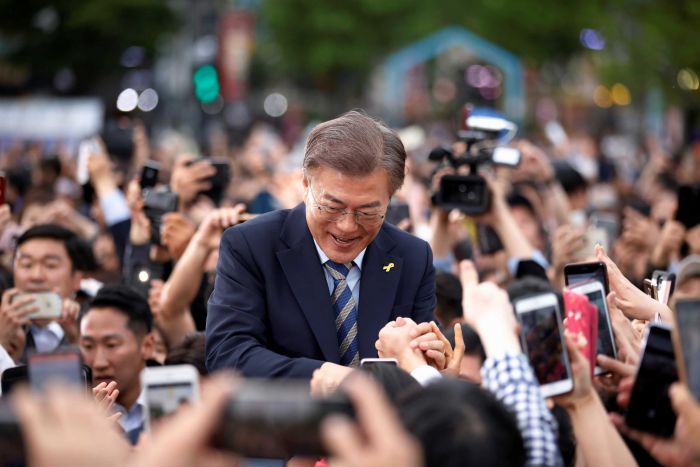Easy Night for Moon Conceals Looming Dangers in Korea and Beyond

EghtesadOnline: South Korea’s new leader Moon Jae-in had only a few hours to celebrate. With his predecessor in jail, he’s starting his single five-year term on Wednesday with a host of problems on his desk.
Kim Jong Un’s regime regularly warns Seoul of nuclear destruction. Donald Trump has threatened to tear up a trade pact. And the de facto head of Samsung Electronics Co. -- South Korea’s biggest company -- is detained on bribery charges, according to Bloomberg.
“He’s coming into a situation that is replete with domestic and foreign policy challenges,” said Victor Cha, senior adviser and Korea chair at the Center for Strategic and International Studies in Washington. “He’s got China breathing down his neck, he’s got North Korea on a testing warpath, relations with Japan are spiraling downward and he doesn’t have a majority in the legislature.”
At home, things aren’t any easier. South Korea’s economy is forecast to expand this year at the slowest pace since 2012, youth unemployment has doubled in recent decades and a quickly aging society poses a threat to public finances. Calls are growing to get tough on large family-run conglomerates that account for almost three quarters of the main index’s market capitalization.
Moon’s landslide win appears more due to the collapse of his opponents -- in disarray after the impeachment of former President Park Geun-hye on corruption charges, which she denies -- than an endorsement of his vision for South Korea.
Moon’s proportion of the total vote was near the lowest of any leader since the nation’s first democratic election in 1987. The presence of five major candidates this time around was unusual for South Korea, which traditionally has two-horse races for president.
“This was not a game-changing election with ideological shifts,” said Timothy Rich, an assistant professor at Western Kentucky University who studies East Asia politics. “This was an election about the economy and corruption. The backlash emanating from the Park impeachment certainly altered the electoral playing field.”
Success for Moon hinges on his ability to find common ground across the political spectrum. That includes conservative leaders in South Korea who can block his agenda in parliament and right-leaning world leaders like Trump and Prime Minister Shinzo Abe, who has increased defense spending and sought to revise Japan’s pacifist constitution.
Moon sought to reach out to opponents on election night, saying he would work with other political parties and become a “president for everyone.”
Anticipation of a Moon victory helped spur a stock rally on hopes that corporate governance reforms will lead to more profits and dividend payouts. The Kospi index hit a record high on Monday as prospects for the global economy brightened. It was 0.2 percent higher in early trade on Wednesday, with technology stocks rising on hopes Moon will boost growth in the sector.
Yet while dozens of chaebol reform proposals have been made in parliament, lawmakers say only superficial measures are likely to pass. Procedural rules require a consensus before a bill is put up for a vote even though Moon’s party is the largest. The next parliamentary election isn’t until 2020.
Moreover, Moon may quickly see his own authority dimmed amid the continued backlash against Park’s presidency. Lawmakers are considering a constitutional changeto reduce the powers of the post.
‘Helpful Shift’
Moon might have more luck with North Korea. He advocates a partial return to the Sunshine Policy of his liberal camp that was abandoned under about a decade of conservative rule.
One major point of tension is the U.S. deployment of the Terminal High Altitude Area Defense system, known as Thaad, in South Korea. Thaad has increased tensions between South Korea and China and Moon blasted the U.S.’s speedy deployment of the missile shield.
At the same time, Moon agrees with Trump that the policy under the Obama administration was a failure. Both of them have said they’ll meet with North Korea’s Kim under the right circumstances.
Moon’s win “could lead to an important and helpful shift in the international community’s approach to halting and reversing North Korea’s increasingly dangerous nuclear and missile programs,” said Daryl Kimball, executive director of the Washington-based Arms Control Association.
Trade Deal
Other risks remain. Trump has threatened to renegotiate the South Korea-U.S. free-trade deal and have Seoul pay for Thaad. Moon has criticized a previous deal with Japan on a dispute over World War II sex slaves, potentially raising tensions with Abe.
Coordination is crucial among the U.S., Japan and South Korea to stop Kim from developing more powerful nuclear weapons and missiles that threaten all three countries, according to Duyeon Kim, a visiting senior fellow at the Seoul-based Korean Peninsula Future Forum.
“The Washington-Seoul alliance may get dicey because of their fundamentally divergent approaches toward North Korea, but it will depend heavily on the two leaders’ initial contact and how they manage their differences,” Kim said. “It is imperative that Washington and Seoul coordinate their North Korea policy so that there is no daylight for Pyongyang to exploit.”


